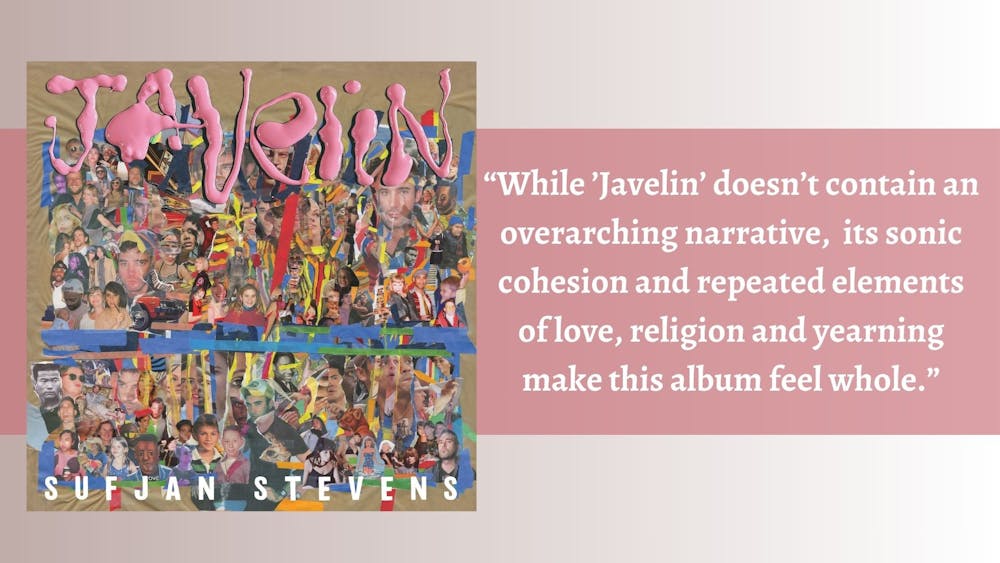Sufjan Steven’s first solo album in three years, “Javelin,” was released on Oct. 6. After he lost his partner and had to learn how to walk again during his treatment for Guillain-Barré syndrome, I didn’t expect to see an album from him this year.
Still, “Javelin” is one of his most vulnerable records to date.
Stevens dedicated this album to his late lover, whom he lost in April. The love and longing is present in “Goodbye Evergreen,” the album’s opening track which also holds the heaviest instrumentation on the record.
Steady piano chords layer under Stevens’s voice as he repeats “Goodbye Evergreen / You know I love you” throughout the song. After the first verse, the song bursts into a cacophony of almost mechanical sounds accompanied by a choir singing alongside Stevens.
These sounds ebb away before melodic instrumentations and chimes draw to the forefront. “Goodbye Evergreen” finishes on a trailing off “You know I love” followed by a solitary melody slowly fading out. Juxtaposed with the blend of sounds in the middle, the stillness at the end is prominent, and the loss Stevens’ suffered can be felt.
Each track on “Javelin” opens on either isolated piano chords or guitar strums before rising to a crescendo of percussion, strings and choral performances alongside Stevens’ vocals. This structure allows the beginning of each song to feel intimate and focused on Stevens’ voice, before building to a peak full of life. Most tracks end with Stevens or the choir alone over a single instrument, lending the album a steady flow from track to track.
While sad and sentimental, this movement back and forth from simplistic melodies to more complex instrumentation keeps the album from feeling suffocating.
The choir present on “Javelin” consists of only a few voices. It lends a fullness to the atmosphere of the album without overpowering Stevens’ voice. Stevens’ vocal performance is as beautiful as ever; his voice is light and sometimes slightly wavering. Stevens’ falsetto performances draw attention to his lyrics, like on title track “Javelin (To Have and To Hold)” where he ruminates on difficulties in relationships with, “It’s a terrible thought / To have and to hold.”
You may have heard “Will Anybody Ever Love Me?” distilled into a 10-second clip currently circulating on TikTok, but it’s worth a full listen. As Stevens confronts his flaws and desire to be loved that may not be reciprocated, quick guitar strums give the track a restless quality beneath the swelling strings and vulnerable vocals.
“Everything that Rises” follows, showcasing Stevens’ attention to detail in his music. He sings his first chorus, “Everything that rises must converge / Everything that rises in a word” by himself. On his second verse, vocalizations from the choir accompany him, before singing the second verse alongside Stevens. Here, Stevens showcases a sonic representation of the convergence he sings of.
“Shit Talk” commands attention with its eight-and-a-half-minute runtime on a record that runs only 42 minutes. The song tells the story of a tumultuous relationship: “I will always love you / But I cannot look at you.”
As the song carries through different musical movements of strings, choral verses and swelling production, Stevens grapples with feelings of yearning and needing something different in repetitions of “I don’t want to fight at all.” A standout track on the record, “Shit Talk” dissolves into glistening atmospheric synths, giving a moment for reflection.
Enjoy what you're reading?
Signup for our newsletter
“Javelin” concludes with a cover of Neil Young’s “There’s a World.” Stevens departs from the ominous booming instrumentation Young uses. Here, the choir’s accompaniment brings the song to its height, while retaining a mystic quality.
This track retains the religious elements running throughout “Javelin” and ends the album on a hopeful sentiment: “No one else has your part / All God’s children in the wind / Take it in and blow real hard.”
While “Javelin” doesn’t contain an overarching narrative, its sonic cohesion and repeated elements of love, religion and yearning make this album feel whole. “Javelin’s” simple moments of rest and reflection coupled with eruptions of sound keep the record interesting without becoming fatiguing. The easy movement between tracks keeps me playing this album over and over again.
Rating 8.5/10




